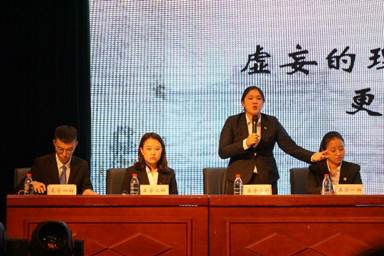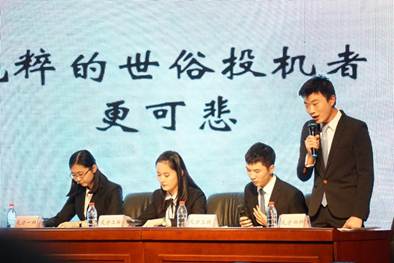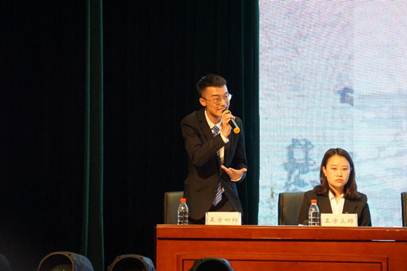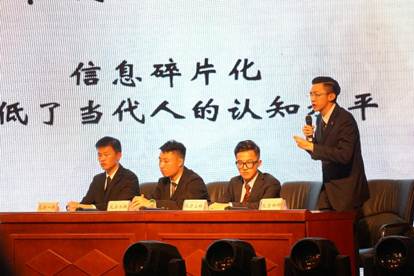November 25th, the Golden Autumn “War of Words” Debate Competition was ceremoniously held at the Wuhan University Humanities Science Hall. The bitter cold winter hardly dampened the audience’s enthusiasm for the debate competition, which brought us a feast of wisdom.

Pro side addressing inquiries
A short video was played first, carrying sincere encouragements from the other 28 debate teams. After that, two teams, with the School of Law on the proposition side and the College of Life Sciences on the opposition side, contested for the third place of the competition. Circling around the topic—which is more tragic, a quixotic idealist or a utilitarian speculator (the former as the pro side and the latter as the con side)—the two teams presented their ideas to support their side of the debate; all the while questioning the validity of their opponents’ opinions as well. The judges voted to determine the winner. Eventually, the School of Law won the debate with a 6:1 vote. The two teams were awarded respectively the third place and fourth place in the “War of Words” Debate Competition. Chen Zihao, the fourth debater on the con side, was awarded the best debater of the competition.

Best debater of the competition, Chen Zihao
Li Nan, with his splendid performance as the fourth debater on the pro side, said: “Both teams have done a good job during the debate and we match each other in nearly every respect. The reason for our victory may just be that the four of us performed more cooperatively.” He also showed his respect for the debate team from the College of Life Sciences and described this competition as a “meaningful” one. “We university students are forced to be a speculator sometimes while we are at times too quixotic. Both attitudes should not be overly advocated by themselves. Just squarely face reality and figure out what we really need.” He concluded.

Li Nan summarizing the pro side’s main ideas
After a short break, the exciting championship finally began. The two sides debated on the influence that the fragmentation of information has on the cognitive ability of modern human beings, with the pro side, the School of Marxism, holding the view that the fragmentation of information improves the cognitive ability, and the con side, the School of Printing and Packaging, deeming that it leads to a reduction of cognition ability.
Starting with the definition of “fragmentation of information” and “cognitive ability”, the pro side argued that fragmentation made it more convenient for people to gain knowledge. They The illustrated the idea with the example of “Weibo”. “Weibo” provides people with a massive amount of information, hence one can easily improve their cognitive ability with less time, according to the pro side’s statement.
While the con side rapidly pointed out that fragmentation will unavoidably destroy the inner logic of information and further cause distraction and the declining of memory. The “fragmentation of information” was not the same as “information fragments”, as the con side concluded. The topic of “Weibo” was raised again by the con side to refute the pro side’s argument. They asserted that the information acquired on “Weibo” was illogical and hard to absorb. The con side stated at last, to truly understand an incident is a process of anti-fragmentation; however, fragmentation interferes with people’s deep thinking and ultimately results in the reduction of cognitive ability.
Later, during the free debate portion, two sides argued on the relation between attention and cognitive ability. The pro side considered it unrealistic to popularize systematic reading among common citizens. Consequently, the accumulation of knowledge gained from fragmental reading should be regarded as the improvement of cognition. Nevertheless, the con side argued that the logical gathering of information was nothing but a process of systematization.
The audience responded to the fierce competition with applause. Finally, after the judges’ vote, the School of Printing and Packaging on the con side won the debate 4:3 and got first-prize in this year’s Golden Autumn “War of Words” Debate. Meanwhile, the School of Marxism was awarded the second place. Zhang Zheyuan, the fourth debater of the con side, captured the best debater title.

Best debater of the championship, Zhang Zheyuan
As one of the judges, Su Dechao, a professor from School of Philosophy, made some comments on the topic of the debate. “The main divergence between the two sides is the definition of fragmentation. The pro side thinks it a neutral phenomenon while the con side thinks fragmentation is equivalent to disorder and illogic.” He said.
Also, when asked about how this topic was related to university students, Su said: “There are two perspectives on this issue. On one hand, we must obtain knowledge piece by piece, because if we accept knowledge as a whole, it would be too much for us. So there exists a natural process of fragmentation of information which we can’t deny. However, on the other hand, these fragments of information should be combined into a system of knowledge which requires systematic learning.”
“Use fragmental time to do fragmental learning, while use consecutive periods of time to do systematical learning.” Su concluded.

Professor Su Decaho from the School of Philosophy
According to Professor Su Dechao, debates make a person open-minded. But what really matters is not debate itself. It’s not about arguing with opponents or winning the competition. It’s about the process in one’s mind during which deeper thinking takes place.
“Aspiring to truth, that’s what debate is all about.” Said Su.
Photo by Chen Ziyao
Edited by Xu Yixian, Wang Wei, Edmund Wai Man Lai & Hu Sijia